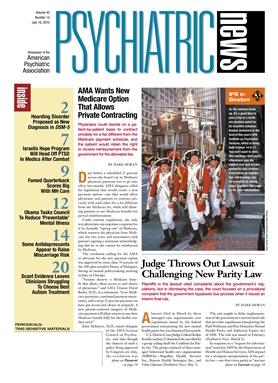A lawsuit filed in March by three managed care organizations over regulations issued by the federal government interpreting the new mental health parity law was dismissed last month.
U.S. District Court Judge Colleen Kollar Kotelly on June 21 dismissed the case filed by a group calling itself the Coalition for Parity Inc. The group consisted of three managed behavioral health care organizations (MBHOs)—Magellan Health Services Inc., Beacon Health Strategies Inc., and Value Options (Psychiatric News, May 7).
The suit sought to delay implementation of the government's interim final rule that provides regulations interpreting the Paul Wellstone and Pete Domenici Mental Health Parity and Addiction Equity Act of 2008. The rule was issued in February (Psychiatric News, March 5).
In response to a “request for information” issued in 2009 by the Department of Health and Human Services, APA argued for a stringent interpretation of the parity law—one that views parity as “not just about equality of coverage, but equality of access to care and equality in how providers are treated relative to other providers,” APA Director of the Office of Healthcare Systems and Financing Irvin “Sam” Muszynski, said (Psychiatric News, June 19, 2009).
Regarding the dismissal of the parity lawsuit, Muszynski said in an interview, “Obviously we are happy with the result and hope it removes a cloud so that the Department [of Health and Human Services] can proceed posthaste with a final rule.”
He added that though for most plans the regulations will not take effect until January 1, 2011, there is a “good faith compliance standard” by which plans will be expected to begin making changes to meet the law's requirements.
The government's final interim rule was largely in line with APA's interpretation, and that interpretation was at the heart of the dispute: can MBHOs impose certain kinds of management strategies not imposed on medical-surgical services and still comply with the parity law?
But in dismissing the suit, Kollar Kotelly focused almost entirely on a more arcane procedural complaint brought by the MBHOs—namely, the claim that the government bypassed due process by issuing an interim final rule implementing the law, instead of following the more typical process of issuing a “proposed rule for comment.”
The judge cited a “good cause” exception to that process in the Administrative Procedure Act, which governs the issuance of regulatory guidance by the government. She also cited the fact that Congress had authorized issuance of an interim final rule in view of the complex nature of the new parity law.
“[B]ased on the totality of the circumstances surrounding [the government's] promulgation of interim final rules to implement the [parity law], the court finds that [the government] properly invoked the ‘good cause’ exception to the notice and comment requirements of [the Administrative Procedure Act],” Kotelly ruled. “The court reaches this conclusion based on the congressional authorization for the issuance of interim final rules [and] the need for prompt regulatory guidance....”
In response to the dismissal, a lawyer for the coalition contacted by Psychiatric News issued the following statement:
“Members of the Coalition for Parity fought for and strongly supported the Paul Wellstone and Pete Domenici Mental Health Parity and Addiction Equity Act of 2008. The Coalition took issue with the rule-making process because the [interim final rules] were announced without prior notice or a period for public comment, as required by the [Administrative Procedures Act], and could have negative, unintended consequences for patients and providers alike.
“While the Coalition for Parity is disappointed in the ruling, it intends to work closely with the government to ensure the original intent of the Act, to increase patient access, is fully realized.”
Jennifer Tassler, J.D., deputy director for regulatory affairs in the APA Department of Government Relations, told Psychiatric News that “now that the suit has been dismissed, there is no question that the government's interim final rule stands and is in effect for plans whose policies begin the calendar year July 1.”
However, Tassler noted that for most plans the regulations will take effect January 1, 2011, when most insurers begin their new plan year. She also said that APA would begin outreach to the business community to help monitor compliance with the law and urged psychiatrists to contact APA if they experience problems with compliance on the part of patients' health plans.
The MBHOs' complaint about the interim final rule involved two substantive issues—one that requires a single deductible for both mental health and other medical conditions and one that prohibits “nonquantitative” treatment limitations.
The latter include medical management standards, formulary design, standards for provider admission to networks, fail-first policies and step-therapy protocols, and conditioning benefits on completion of a course of treatment.
Such practices are prohibited under the government's interpretation of the paritiy law if they are not applied comparably to other medical-surgical services.
In their suit, the MBHOs insisted that the nonquantitative treatment limitations are essential to managing behavioral health care costs and maintaining equality of coverage. They claimed as well that the unified deductible for both mental health and general medical care would result in cost increases and serve as a barrier to care for lower-income individuals (
Psychiatric News, May 7).

